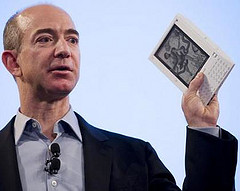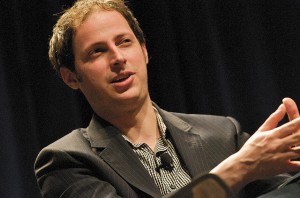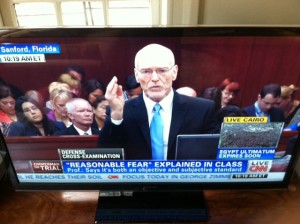In exchanges with Washington Post reporter Barton Gellman prior to his name becoming public, Edward Snowden said something that got overlooked.
Whistleblowers before him, he said, had been destroyed by the experience. Snowden wanted “to embolden others to step forward,” he wrote, by showing that “they can win.”
It’s not enough to defy the government and reveal what it wants to keep secret. When you go up against the most powerful and secretive forces on the planet, you have to try to win. It sounded kooky at first, or completely outrageous, but after President Obama’s August 9th press conference it was difficult to deny that Snowden had won— not a complete but still a significant victory.
Congress had woken up to its oversight responsibilities and was finally debating the limits of the surveillance state. Lawmakers in both parties were advertising their doubts. Other parliaments around the world were asking questions they had not asked before. The President had been forced to respond with an announcement of some (tepid) reforms and a press conference intended to restore public confidence after the Snowden effect flipped the polls around. (Link.) When Obama tried to argue that he had been ahead of the game on transparency and the protection of whistleblowers and would have wound up in the same place without Snowden’s actions, it was hard to imagine anyone in the know buying it. As The Economist said:
Mr Obama laments that the debate over these issues did not follow “an orderly and lawful process”, but the administration often blocked such a course. For nearly five years it appeared comfortable with the secret judicial system that catered to executive demands. It prized the power to spy on Americans, and kept information from Congress. Mr Snowden exposed all of this. His actions may not have been orderly or lawful, but they were crucial to producing the reforms announced by Mr Obama.
On Meet the Press Sunday, the talkers talked about it. First question from David Gregory: “Has Edward Snowden won?” Watch:
Visit NBCNews.com for breaking news, world news, and news about the economy
On Meet the Press they also talked about the sale of the Washington Post to Amazon.com founder Jeff Bezos. But they did not try to connect the two stories, even though one of the living connections — Barton Gellman, who writes for the Post and was contacted by Snowden — was on the program.
…Bart Gellman, the kind of work you do requires not only sources deep inside the intelligence community, but editors and owners who are willing to defy the government and publish over its strongest objections. If you had been able to talk to Jeff Bezos before he bought the Washington Post, what would you have told him to expect about this part of the job– publishing the secrets his reporters dig up?
David Gregory didn’t ask Gellman that, but he could have. For one of the biggest unknowns in the story of Bezos taking over the Post has nothing to do with adapting to the internet or finding a new business model for newspapers. It’s whether Bezos has the inner strength to go up against the most powerful and secretive forces on the planet. When his free press moment comes — and it will come — will Jeff Bezos answer the bell?
It came for the New York Times and the Washington Post in 1971 with publication of the Pentagon Papers, a case that went to the Supreme Court and could have been lost, with enormous consequences for press freedom in the United States.  It came for the Post again during Watergate, with Nixon threatening the company and Attorney General John Mitchell making his famous declaration. (“Katie Graham’s gonna get her tit caught in a wringer.”) It came for the Times again when James Risen and Eric Lichtblau uncovered warrantless wiretapping by the Bush Administration before the election in 2004, although in a fateful decision the Times didn’t publish the story until 2005.
It came for the Post again during Watergate, with Nixon threatening the company and Attorney General John Mitchell making his famous declaration. (“Katie Graham’s gonna get her tit caught in a wringer.”) It came for the Times again when James Risen and Eric Lichtblau uncovered warrantless wiretapping by the Bush Administration before the election in 2004, although in a fateful decision the Times didn’t publish the story until 2005.
When you read retrospective accounts of those decisions, what stands out is the nerve of the publishers as the government brings its might down and an almost unimaginable pressure builds. (And don’t think it hasn’t been felt in The Guardian’s offices lately.)
Through his company, Amazon, Jeff Bezos is already enmeshed in the surveillance state. One sign of that: Amazon’s $600 million deal to build cloud computing infrastructure for the CIA. Another was reported by the Post in its profile over the weekend:
As chief of Amazon, Bezos has also confronted some First Amendment issues, maybe most prominently in its handling of a situation involving WikiLeaks.
In November 2010, WikiLeaks began using Amazon’s Web hosting service to leak thousands of pages of State Department cables. But the company abruptly terminated the contract within 24 hours of receiving a call from a staff member for the Senate Homeland Security and Governmental Affairs Committee.
In a statement at the time, Amazon said WikiLeaks was expelled from its site because it violated the terms of its agreement with the company, not because of “a government inquiry.”
That’s not answering the bell for freedom of information. That’s doing what the surveillance state requires, and relying on a legalism to justify it. This is exactly the kind of behavior Edward Snowden was reacting against when he made his decision to go AWOL and reveal key documents to The Guardian and the Washington Post.
“The public needs to decide whether these programs and policies are right or wrong,” he said in the interview that introduced him to the world. It’s true, as his many critics contend, that Snowden made that call — the public must decide this, and therefore has to know about it first — on his own, without legal authority, simply because he thought it right. The only way he could win was to later be found correct in his assessment: that if the public knew, the surveillance state would be unable to defend the lengths to which it had gone.
If Jeff Bezos owns the Washington Post for, say, twenty years, he will probably have to make a call like that. On his own. Without legal authority.  Simply because he thinks it right. “Not the state but the public gets to decide this.” It may also be an icy gamble with the business, as Katharine Graham’s decisions were when she had to make them. No firewall between the Post and Amazon will necessarily be respected when the most powerful hidden hands in the world are motioning for you to back down.
Simply because he thinks it right. “Not the state but the public gets to decide this.” It may also be an icy gamble with the business, as Katharine Graham’s decisions were when she had to make them. No firewall between the Post and Amazon will necessarily be respected when the most powerful hidden hands in the world are motioning for you to back down.
We don’t know what Bezos will do. Neither does he. If, as is often said about him, he thinks long term, then he will answer that bell, and come out swinging. But that is not the test. The test is to know your strength, cooly survey the situation, and find a way to win. 
After Matter: Notes, Reactions & Links
“I think if the American public knew what our government was doing, they wouldn’t be allowed to do it anymore.” These are the poignant words of Ladar Levison, founder of Lavabit, the secure email service that he voluntarily shut down when faced with some sort of demand from the U.S. government to reveal user information— which he cannot talk about for fear of being thrown in jail. But we know that Lavabit was used by Snowden to communicate with the outside world when he was stuck in the Moscow airport.
If the public knew what the government was doing, it wouldn’t be allowed to do it anymore. That is a perfect description of a Fourth Estate situation, where the only way democracy can work is if the press uncovers the truth and publishes it, bringing public opinion into play and changing the equation for people in power. If the press cannot come through and perform the way it should, the public will remain in the dark, and an illegitimate state action will persist. “My hope is that, you know, the media can uncover what’s going on, without my assistance,” Levison said. He’s like a whistleblower who will go to jail if he uses his whistle. All he can do is give truncated interviews. But it’s clear that Snowden’s determination “to embolden others to step forward” is working. Ladar Levison is proof.
All PressThink posts about Edward Snowden, journalism and the surveillance state
* Politics: some / Politics: none. Two ways to excel in political journalism. Neither dominates. (June 13, 2013) “Edward Snowden’s decision to leak to Greenwald, and Glenn’s domination of newsland for several days, tells us that politics: none is not the only way of excelling in journalism. It now has to share the stage with politics: some.”
* No, Candy Crowley. That is not good enough. (June 16, 2013) “You have to know your stuff. You have to mute your instinct to reduce everything to the next election. This is serious business. We need interviewers who are dead serious about holding people accountable.”
* David Gregory tries to read Glenn Greenwald and The Guardian out of the journalism club (June 24, 2013.) “His premise packs a punch. For the criminalization of journalism is most likely to happen when normal relationships with sources get called ‘aiding and abetting’ by the state.”
* The Snowden effect: definition and examples. (July 5, 2013) “There’s what Snowden himself revealed by releasing secrets and talking to the press. But beyond this, there is what he set in motion by taking that action.”
* The Toobin principle. (August 6, 2013) “Repeal the concept of an informed public, repress your decision to take such a drastic step. But it’s not just Jeffrey Toobin. Congress did it too.”
* Edward Snowden, meet Jeff Bezos. (August 11, 2013) “What we do know about Snowden is something we don’t know about the new owner of the Washington Post: whether he can go up against the most powerful and secretive forces on the planet… and win.”
* When you’re in a Fourth Estate situation. (August 15, 2013) “As things stand today, the Fourth Estate is a state of mind. Some in the press have it, some don’t. Some who have it are part of the institutional press. Some, like Ladar Levison and Edward Snowden, are not.”
* Conspiracy to commit journalism. (August 20, 2013) “If sunlight coalitions are to succeed, they won’t succeed by outwitting surveillance. Not better technology, but greater legitimacy is their edge.”
* To make journalism harder, slower, less secure. (August 26, 2013) “That’s what the surveillance state is trying to do. It has the means, the will and the latitude to go after journalism the way it went after terrorism. Only a more activist press, working together, stands a chance of resisting this.”
* The NSA’s next move: silencing university professors? (The Guardian, September 10, 2013) “A Johns Hopkins computer science professor blogs on the NSA and is asked to take it down.”
* The BBC’s 16 questions to Glenn Greenwald. “Hey, that was a tough interview! No, not really.” (PressThink, Oct. 4, 2013)
* Why Pierre Omidyar decided to join forces with Glenn Greenwald for a new venture in news. “Word leaked out that Glenn Greenwald would be leaving the Guardian to help create some new thing backed by Pierre Omidyar, the founder of eBay. I just got off the phone with Omidyar. So I can report more details about what the new thing is and how it came to be.” (PressThink, Oct. 16)
* The limits of investigative reporting. “How two media accounts of the intrusive security state led to different political outcomes.” (American Review, Oct. 25, 2013.)
Photo credit: mattopenzeo, Creative Commons.


